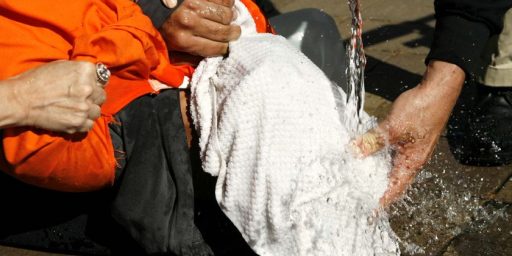The Torture Myth
Anne Applebaum has an interesting piece in today’s WaPo on what she dubs “The Torture Myth.”
But does torture work? The question has been asked many times since Sept. 11, 2001. I’m repeating it, however, because the Gonzales hearings inspired more articles about our lax methods (“Too Nice for Our Own Good” was one headline), because similar comments may follow this week’s trial of Spec. Charles Graner, the alleged Abu Ghraib ringleader, and because I still cannot find a positive answer. I’ve heard it said that the Syrians and the Egyptians “really know how to get these things done.” I’ve heard the Israelis mentioned, without proof. I’ve heard Algeria mentioned, too, but Darius Rejali, an academic who recently trolled through French archives, found no clear examples of how torture helped the French in Algeria — and they lost that war anyway. “Liberals,” argued an article in the liberal online magazine Slate a few months ago, “have a tendency to accept, all too eagerly, the argument that torture is ineffective.” But it’s also true that “realists,” whether liberal or conservative, have a tendency to accept, all too eagerly, fictitious accounts of effective torture carried out by someone else.
By contrast, it is easy to find experienced U.S. officers who argue precisely the opposite. Meet, for example, retired Air Force Col. John Rothrock, who, as a young captain, headed a combat interrogation team in Vietnam. More than once he was faced with a ticking time-bomb scenario: a captured Vietcong guerrilla who knew of plans to kill Americans. What was done in such cases was “not nice,” he says. “But we did not physically abuse them.” Rothrock used psychology, the shock of capture and of the unexpected. Once, he let a prisoner see a wounded comrade die. Yet — as he remembers saying to the “desperate and honorable officers” who wanted him to move faster — “if I take a Bunsen burner to the guy’s genitals, he’s going to tell you just about anything,” which would be pointless. Rothrock, who is no squishy liberal, says that he doesn’t know “any professional intelligence officers of my generation who would think this is a good idea.”
Or listen to Army Col. Stuart Herrington, a military intelligence specialist who conducted interrogations in Vietnam, Panama and Iraq during Desert Storm, and who was sent by the Pentagon in 2003 — long before Abu Ghraib — to assess interrogations in Iraq. Aside from its immorality and its illegality, says Herrington, torture is simply “not a good way to get information.” In his experience, nine out of 10 people can be persuaded to talk with no “stress methods” at all, let alone cruel and unusual ones. Asked whether that would be true of religiously motivated fanatics, he says that the “batting average” might be lower: “perhaps six out of ten.” And if you beat up the remaining four? “They’ll just tell you anything to get you to stop.”
Yep. As I noted in March 2003, torturing captive terrorists is
. . . a horrible idea. Not because it’s morally unjustifiable but because it won’t work. For one thing, information obtained under torture is virtually worthless, since people will say anything to stop the pain. For another, we’ve learned from our experiences with prisoners of war that people are a hell of a lot more likely to surrender to you if they know they’ll be treated humanely.
The other argument, that our torturing prisoners makes it more likely that our prisoners will be treated well, is rather dubious given the present enemy, however.





One point that’s not being considered here is the cultural differences.
That someone who, prior to his capture, was quite willing to blow himself up, in the process of killing others… and was willing to wait years to achieve this great goal, does not strike me at the kind of individual who will be swayed by three sqaures, and a roof and so on, to give up information about hgis freinds. Here is someone who has consigned himself to a harsh life and death. He’ll be likely to simply wait out such impronsonment, while giving his captors nothing.
I suspect that torture is more likely to work under such conditions.
I am not sure if tortue is effective or not.
One thing I am sure of is that we should be about something. If we pratice or condone tortue we put ourselves on a moral plane with the terrorists.
The fact that the Bush admin seems to consider torture an option should be troubling to us all. There is a lot more to being “the good guys” then simply proclaiming ourselves to be them.
I’m begining to think that we should simply stop taking prisoners. Classify any combatant in Iraq not wearing a uniform as a spy, and therefore eligible for summary execution. (If I remember my WWII movies.)
And, of course, anjin-san’s formulation leads directly to Eric’s, although many would deny it.
But the thing is, what’s the definition? In the spectrum ranging from the rack and Iron Maiden to unconscionable delays in providing room service, what counts as “torture?”
Regards,
Ric
Personally, I think “anjin-san” looks like an idiot, because no one who knows Japanese would put “-san” after his own name.
This post doesn’t completely solve it either, because the quoted officer was apparently approving of tactics that many of the people fulminating about torture have disapproved of. People have complained about loud music, for example, or other psychological methods, which the quoted officer specifically approves of.
I oppose torture. I don’t oppose every sort of stressful interrogation, though. I’d like a clear line to be drawn. But the “opponents” of torture are doing no better a job in defining that line either.
John you really should get a life. I don’t speak Japanese. I do like James Clavell books. Most literate people get it.